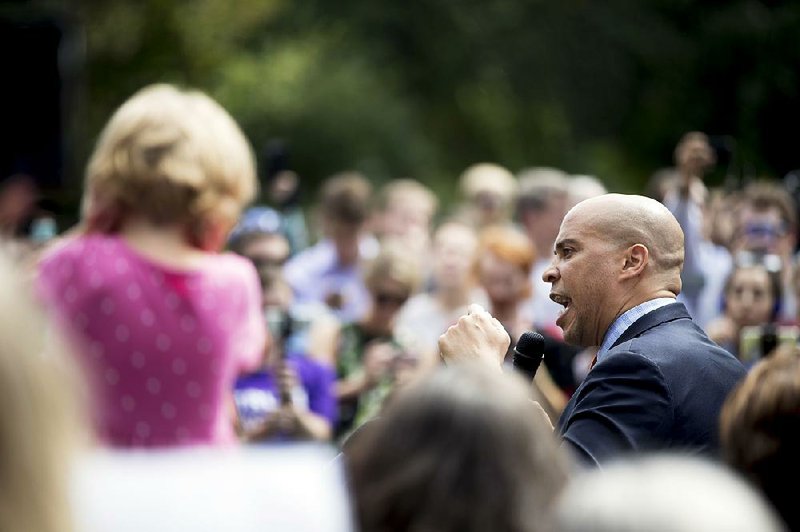WASHINGTON -- The suddenly resurgent Republican effort to undo the Patient Protection and Affordable Care Act was dealt a major blow on Tuesday when a bipartisan group of governors came out against a proposal gaining steam in the Senate.
But it was unclear whether the opposition would ultimately derail the attempt, as key Republican senators including Lisa Murkowski of Alaska said they had yet to make up their minds.
On the other side, 15 Republican governors announced their support for the Senate bill Tuesday evening. The list includes Kentucky's Matt Bevin, whose backing could influence Sen. Rand Paul, R-Ky., who has frequently criticized the legislation for failing to fully repeal the law.
The collective criticism from 10 governors arrived as Vice President Mike Pence and Senate Majority Leader Mitch McConnell, R-Ky., tried to rally support for the bill, which is sponsored by GOP Sens. Bill Cassidy on Louisiana, Lindsey Graham of South Carolina, Dean Heller of Nevada, and Ron Johnson of Wisconsin.
"We ask you not to consider the Graham-Cassidy-Heller-Johnson amendment and renew support for bipartisan efforts to make health care more available and affordable for all Americans," the governors said in their letter.
They added that they prefer a bipartisan push to stabilize the insurance marketplaces that Sen. Lamar Alexander, R-Tenn., and Patty Murray, D-Wash., have been negotiating.
Alexander on Tuesday played down expectations of reaching an agreement this week, telling reporters the pair had reached an impasse.
"During the last month, we have worked hard and in good faith but have not found the necessary consensus among Republicans and Democrats to put a bill in the Senate leaders' hands that could be enacted," Alexander said in a statement.
Democrats denied that the talks had fallen apart, accusing Republicans of walking away despite making progress on areas of disagreement. A spokesman for Senate Minority Leader Charles Schumer, Matt House, said Democrats offered to accept a number of GOP requests, including waivers to give states more latitude in how they spend federal dollars.
"This is not about substance," House said in a statement. "The Republican leadership is so eager to pass Graham-Cassidy that they're scuttling a balanced, bipartisan negotiation."
Arkansas Gov. Asa Hutchinson on Tuesday endorsed the bill, calling it "an opportunity to continue the care that we have innovated in Arkansas."
"I see this as the best and last opportunity to repeal the Affordable Care Act, which is the wrong direction for America," the governor, a Republican, told reporters.
Arkansas' version of Medicaid expansion is called Arkansas Works and provides health care coverage to about 300,000 Arkansans.
The state is paying 5 percent of the cost of the program this year -- about $100 million -- and its share would increase to 10 percent by 2020 under the existing law.
Under the Graham-Cassidy bill, Arkansas wouldn't be required to provide matching funds, freeing up more than $1 billion in state general revenue between 2020 and 2026 for overall state needs, including health care assistance, Hutchinson said.
The governors who signed the letter against the bill are notable because some are from states represented by Republican senators who are weighing whether to back the bill. Among them: Alaska's Bill Walker, an independent who holds some sway over Murkowski, a potentially decisive vote who opposed a previous Republican effort to repeal the Affordable Care Act.
Nevertheless, Murkowski said Tuesday afternoon that she was still weighing her options.
"If it can be shown that Alaska is not going to be disadvantaged, you gain additional flexibility, then I can go back to Alaskans and I can say, ' OK, let's walk through this together.' That's where it could be different," she said.
But Murkowski, who has been in close touch with Walker, said she didn't yet have the data to make that determination.
Paul has announced his opposition to the legislation, saying it doesn't go far enough in repealing "Obamacare."
McConnell declined to ensure a vote on the bill but said his team is working to secure sufficient support.
"We're in the process of discussing all of this. Everybody knows that the opportunity expires at the end of the month," said McConnell, referring to the limited window Republicans have to take advantage of a procedural tactic to pass a broad health care bill without any Democratic support.
The current bill would give states control over billions in federal health care spending, through block grants, and enact deep cuts to Medicaid. The Medicaid cuts are a major source of concern to the governors, both in terms of imposing a per-capita cap on what states would receive as well as restrictions on how they could spend any federal aid on their expanded Medicaid populations.
It maintains the largest tax increases imposed by the 2010 law, using them to fund block grants to states.
The new repeal bill would keep levies on top earners -- a 3.8 percent tax on net investment income and a 0.9 percent Medicare surtax for individuals earning more than $200,000 or couples above $250,000. It also would preserve a tax on health insurers. Each of those levies would raise more than $100 billion in revenue over a decade, according to the nonpartisan Congressional Budget Office.
But the bill would repeal three smaller levies: a 2.3 percent sales tax on medical devices, a tax on over-the-counter medication and levies on contributions to health savings accounts.
Information for this article was contributed by Sean Sullivan, Kelsey Snell, Juliet Eilperin, Ed O'Keefe and Ashley Parker of The Washington Post; by Erica Werner, Alan Fram, Kevin Freking, Andrew Taylor, Richard Lardner and Julie Carr Smyth of The Associated Press; by Sahil Kapur of Bloomberg News; and by Michael R. Wickline of the Arkansas Democrat-Gazette.
A Section on 09/20/2017


